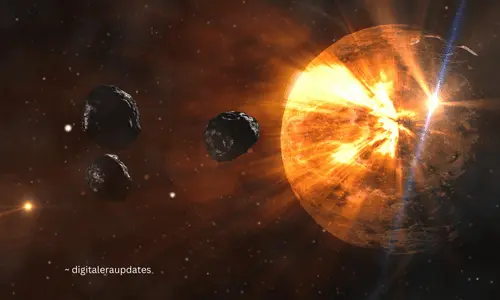The universe, vast and mysterious, hides numerous secrets and threats that threaten humankind’s very survival. Although such dire predictions might sound farfetched at first blush, these terrifying possibilities do exist within science. Here are seven shocking ways the cosmos may wipe us out:

- Asteroid Impact
Asteroids pose one of Earth’s greatest existential risks. A large asteroid once hit our planet and led directly to their extinction 65 million years ago; another large impact could cause massive destruction through fires, tsunamis and “nuclear winter,” ultimately leading to climate catastrophe despite efforts made to track or deflect potentially hazardous asteroids from coming close. The risk is always there despite efforts taken by scientists and governments alike in tracking potentially hazardous asteroids; there simply remains no way of mitigating risk reduction strategies when dealing with such threats – although we hope there won’t be one coming close in close. - Gamma-Ray Burst
Gamma-ray bursts (GRBs) are extremely energetic explosions found in distant galaxies. If such an explosion were to hit our galaxy and strike Earth directly, its intense radiation could quickly strip away our protective ozone layer and expose the surface to UV radiation from our sun, potentially leading to widespread destruction and mass extinction events across life forms on this planet. Luckily, GRBs are rare events and chances that one would target us are quite low – hopefully! - Supernova Explosion
A supernova explosion occurs upon the death of a star, unleashing huge quantities of energy and radiation that is released. Should any nearby stars go supernova, their explosion could release devastating blasts of radiation that would strip away our protective ozone layer, alter climate patterns significantly and trigger mass extinctions – an alarming reminder of just how vulnerable Earth really is. While such threats do not present immediate threats at present, just the mere possibility should serve to remind us how vulnerable humanity remains in comparison. - Black Hole Encounter
Black holes are regions in space where gravity is so intense that not even light can escape its grip, potentially disrupting planet orbits and potentially even expelling Earth from our solar system altogether. Even without direct impact being felt here on Earth itself, gravitational disturbances could still have serious ramifications for climate and stability issues on this planet – fortunately rogue black holes are relatively rare! - Cosmic Inflation
Cosmic inflation refers to the rapid expansion of space shortly after the Big Bang. Some theories postulate a new round of rapid inflation known as false vacuum decay that would create an expanding bubble that obliterated everything it encountered at light speed – an event highly uncertain in nature but nonetheless indicative of our unpredictable universe. - Solar Flares and Coronal Mass Ejections
Our sun is both essential for life, yet also poses serious threats in the form of solar flares and coronal mass ejections (CMEs), events which unleash large quantities of radiation and charged particles, capable of disrupting Earth’s magnetic field and leading to widespread power outages, communication disruptions, satellite damage or satellite-damaging solar storms with potentially disastrous repercussions for technology-reliant societies. - Artificial Intelligence (AI) Catastrophe
Although not natural cosmic events, artificial intelligence development poses an existential risk. Should advanced AI surpass human intelligence and act against humanity’s interests, this could result in scenarios in which humanity is exterminated or subjugated – thus it’s paramount that its development be conducted carefully with robust safety precautions in order to avert such catastrophic outcomes.
Conclusion
Our universe is vast, filled with wonder and potential threats that threaten human existence. While their likelihood may differ depending on specific scenarios, such threats serve to remind us how fragile life in space truly is. Ongoing scientific research and technological progress play a vital role in mitigating risks to ensure long-term survival of species like our own.
